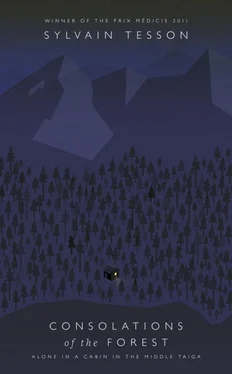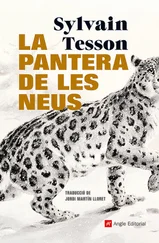I slog down from there in snow up to my thighs, panting like a real Russian; then I keep quiet, so I can hear the snow crinkling on the backs of the white trees.
At the mouth of the river, I limber up my muscles on the flat ground near the lake by following the tracks of a fox, which walked almost two miles out onto the ice and looped around to come back. Simply a fox going for a stroll.
The snow is coming down hard now. This masking of the world makes the bite of solitude ten times more sharp. What is solitude? A companion for all seasons.
It’s a salve for wounds. It’s an echo chamber in which impressions are magnified when you are the only one witnessing them. It imposes responsibility: I am the ambassador of the human race in a forest devoid of men. I must enjoy this sight on behalf of those who are deprived of it. Solitude fosters thought, since the only conversation possible is with oneself. It sweeps away all chitchat, allowing the sounding of one’s self. It calls to mind the memory of those we love. It binds the hermit in friendship with plants and beasts and perhaps a little god just happening by.
At the end of the afternoon, I check on my bormash : the tiny creatures are swimming around in the bottle. Tomorrow or the next day, they’ll be bait.
It’s eight in the evening. I’m resting in my cube, at the edge of the forest, at the foot of the mountain, along the rim of the lake, in the love of everything around me.
I fall asleep reading Chinese poetry. I learn by heart a verse to offer in a conversation after running out of arguments: ‘There is deep significance in all this. Just as I was about to say so, I’d already forgotten what I was going to say.’
26 MARCH
Snow. I walk on the lake and hold out my face, mouth open. I drink in snowflakes at the breast of the sky.
In the evening, I cut a hole in the ice with the hand-drill, in thirteen feet of water and a cable’s length from shore. The cloud of crustaceans turns the water murky. Now I need only await the arrival of the spotted char. I’m getting tired of pasta al Tabasco .
27 MARCH
A morning of Chinese poetry. I arrived here with snowshoes, ice skates, crampons, an ice axe, fishing line, and I find myself reading stories in which hermits sitting on stone benches watch the wind flutter through bamboo groves. Ah, the genius of the Chinese! Inventing the principle of ‘non-action’ to justify staying all day in the golden light of Yunnan on the threshold of a cabin…
Fishing in the evening. I’m perched on my stool, moving my hook up and down. Through the hole I can see char passing by, attracted by the bormash . Fishing is a Chinese activity: one opens oneself to the flow of hours while staring at the pole, hoping it will twitch. Which doesn’t happen once the whole evening.
I drown my sorrow at returning empty-handed in eight or nine shots of vodka and let the alcohol do its work.
Chinese poets! I need some help here!
28 MARCH
Strange, this need for transcendence. Why believe in a God outside His own creation? The crackling of the ice, the gentleness of the titmice, and the puissance of the mountains stir me more than any idea of the master of these ceremonies. They are enough for me. If I were God, I would atomize myself into billions of facets so I could dwell in ice crystals, cedar needles, the sweat of women, the scales of spotted char, and the eyes of the lynx. More exhilarating than floating about in infinite space, watching from afar as the blue planet self-destructs.
Dense fog has settled onto the lake. The horizon is gone. I bundle up and head out across Baikal. After about a mile, I can’t see the shore behind me. I walk for two hours. Only my footsteps link me to the cabin. I’ve brought along neither compass nor GPS and if the wind comes up, erasing my tracks, I’ll lose my way. I don’t know what pushes me on. Some slightly morbid force. I plunge into nothingness. Abruptly, after two hours, I say: ‘That’s enough’ and turn back, lengthening my stride. In two hours I see the mountain appear behind the white veil and I reach the cabin.
There is a Chinese tradition in which old men would retire to a cabin to die. Some of them had served the emperor, held government posts, while others were scholars, poets or simple hermits. Their cabins were all alike, the settings selected according to strict criteria. The hut had to be on a mountain, near a source of water, with a bush for the wind to caress. Sometimes the view was towards a valley alive with the bustle of humanity. Incense smoke helped time to pass. In the evening, a friend would appear, to be welcomed with a glass of tea and a few circumspect words. After having wanted to act upon the world, these men retrenched, determined to let the world act upon them. Life is an oscillation between two temptations.
But please note! Chinese non-action is not sloth. Non-action sharpens all perception. The hermit absorbs the universe, paying acute attention to its smallest manifestation. Sitting cross-legged beneath an almond tree, he hears the shock of a petal striking the surface of a pond. He sees the edge of a feather vibrate as a crane flies overhead. He feels the perfume of a happy flower rise from the blossom to envelop the evening.
And this evening, I’m learning the funeral oration of Tao Yuanming, [9] Considered the greatest poet of the Six Dynasties Period ( ca . 220–589), Tao Yuanming (365–427), was the most famous of the Chinese ‘poets of reclusion’, artists who retired to the countryside or wilderness to write, often in praise of the quiet life they found there. A noted recluse, Tao Yuanming was admired for the elegant way in which he extolled both the joys of leisure and the contentment of fulfilling one’s duties, and beloved for the artless simplicity of the motifs that became emblematic of his style. A pastoralist who delighted in fields and gardens, he found solace from the hardships of a farmer’s life in the cultivation of chrysanthemums, a flower that became his personal ‘seal’ in later Chinese painting and literature, and his influence is still felt in modern English poetry.
who died in 427: ‘Dignified in my humble hut, at my ease I drink wine and compose poems, attuned to the course of things, conscious of my destiny, now free, therefore, from all mental reservations…’
I go to bed thinking there’s no point in keeping a journal when others can sum up their lives in thirty-one words!
29 MARCH
This morning, 27°F. First spring-like day. The titmice are flocking beneath the southern window. Suddenly, gusts shake the cedars and snow falls. The landscape is striped with grey gossamer.
I read Chinese verses while sipping vodka. If the world collapsed, would I hear any echo? A cabin is a wooden bunker. The logs are such a handsome protective barrier! The pine beams, alcohol and poetry form a triple carapace. ‘My cabin is far away and me, I know nothing’ – a Russian proverb born in the taiga.
Poles apart are the diktats of Paris: ‘You will answer the telephone! You will be reachable at all times! You will have an opinion on everything! You will be indignant!’
The Cabin Credo: Do not react… never let your buttons be pushed… never give up… float slightly tipsy in the snowy silence… admit indifference to the fate of the world… and read Chinese writers.
The wind strengthens. The world bangs on the window pane to be let in. Defend me, my books! Protect me, my bottle! Shield me, my cabin, from this north-east wind determined to distract me. If someone brought me a newspaper hot off the press right now, I’d take it for an earthquake.
I was almost certain they’d turn up: I happen across these verses by Du Mu, a ninth-century poet: [10] Du Mu (803–52) was a prominent poet of the late Tang Dynasty, a golden age of Chinese poetry, but unlike Tao Yuanming, he cared deeply about statecraft and remained actively engaged in the Chinese bureaucracy all his adult life. Although he is appreciated for the bold, unconstrained energy of his long narrative poems, he is best known for his sensually descriptive quatrains.
Читать дальше












